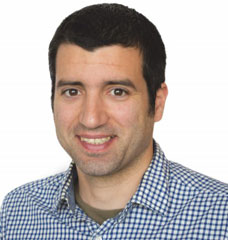Systems Biology: From Large Datasets to Biological Insight
8–12 July 2019
Wellcome Genome Campus, UK
Hands-on training in using large-scale multi-omics data and machine learning to infer biological models.
Summary
For some time, advances in computer science and high performance computing have led to ground-breaking developments in systems biology model inference. However, only now has there been sufficient large-scale data available to parameterise these models and use them usefully. Similarly, machine learning approaches have recently started having a significant impact in our analysis of large omics datasets and extraction of useful biological knowledge.
Therefore this course, run in collaboration with EMBL-EBI, will provide timely advanced-level training in using large-scale multi-omics data and machine learning to infer biological models.
The programme is aimed at researchers who are using large multi-omics datasets to infer systems biology models. This is an advanced-level course, and so we will select applicants who already have some experience (ideally 1-2 years) of working with systems biology modelling or related large-scale multi-omics data analysis. Additionally, applicants will be expected to have a working knowledge of using Linux commands, and experience of using a programming language (e.g. Python or Perl).
Programme
The programme will include, lectures, discussions and practical computational exercises covering the following topics:
- Introductory session
- Omics data integration / reduction and interpretation
- Protein-protein interaction, gene regulatory and signalling network inference
- Logic modelling
- Machine learning / deep learning for model inference
Learning Outcomes
After the course the participants should be able to:
- Discuss and apply a range of data integration and reduction approaches for large scale omics data
- Describe principles behind different machine learning methods and apply them on omics datasets to extract biological knowledge
- Infer biological models using machine learning and statistical methods
- Identify strengths and weaknesses of different inference approaches
- Compare signal propagation through logic modelling vs diffusion-based approaches
- Access, query and retrieve models from public repositories for systems biology
Instructors and speakers
Scientific Programme Committee

Evangelia Petsalaki
EMBL-EBI

Julio Saez-Rodriguez
University of Heidelberg

Alexandra Holinski
EMBL-EBI
Confirmed trainers
Rahuman Sheriff EMBL-EBI, UK
Sarah Keating
Girolamo Giudice EMBL-EBI, UK
Ricard Argelaguet EMBL-EBI, UK
Nicolas Rodriguez Baraham Institute, UK
Leopold Parts Wellcome Sanger Institute, UK
Dmytro Fishman University of Tartu, Estonia
Konrad Förstner ZB MED, Information Center for Life Science and TH Köln, University of Applied Sciences, Germany
Eva-Maria Geissen EMBL Heidelberg, Germany
Javier De Las Rivas University of Salamanca, Spain
Jan Hasenauer Hemholtz Zentrum Muenchen, Germany
Jasmin Fisher UCL Cancer Institute, UK
Oliver Stegle EMBL-EBI, UK
Emanuel Goncalves Wellcome Sanger Institute, UK
Yu Fu EMBL-EBI, UK
How to apply
Prerequisites
Applicants should be researchers who are using large multi-omics datasets to infer systems biology models. This is an advanced-level course, and so we will select applicants who already have some experience (ideally 1-2 years) of working with systems biology modelling or related large-scale multi-omics data analysis. Additionally, applicants will be expected to have a working knowledge of using Linux commands, and experience of using a programming language (e.g. Python or Perl).
How to Apply
Please complete the online application form. Places are limited and will be awarded on merit. If you have any problems with the online application process, please contact us.
Please note: Applications must be supported by a recommendation from a scientific or clinical sponsor (e.g. supervisor, line manager or head of department). A request for a supporting statement will be sent to your nominated sponsor automatically during the application process. Applicants must ensure that their sponsor provides this supporting statement by the application deadline. Applications without a supporting statement cannot be considered.
Travel visas
Successful applicants will be provided with a support letter for their visa application, if required.
Please visit the following websites for further information on visiting the UK:
Cost
| Cost | Accommodation / meals | |
| *Course fee | £630 | This is a residential course and the fee includes all accommodation and meals. |
*The course fee is subsidised by Wellcome Genome Campus Advanced Courses and Scientific Conferences and applies to non-commercial applicants. Please contact us for the commercial fee.
Bursaries
Limited bursaries are available (up to 50% reduction on the course fee) and are awarded on merit. If you would like to apply for a bursary, please complete the bursary section of the online application form.
Where there are many bursary applications, the selection committee may issue smaller amounts.
Bursaries can be applied for as part of the course application form. Applicants will be notified of a bursary award along with their place on the course, usually within one month of the application deadline. The decision of the selection committee is final.
Please note that both the applicant and sponsor are required to provide a justification for the bursary as part of the application.
Additional funding opportunities
Visit our support page for additional financial support currently available.
Accommodation services phishing scam – please be vigilant. More information.

